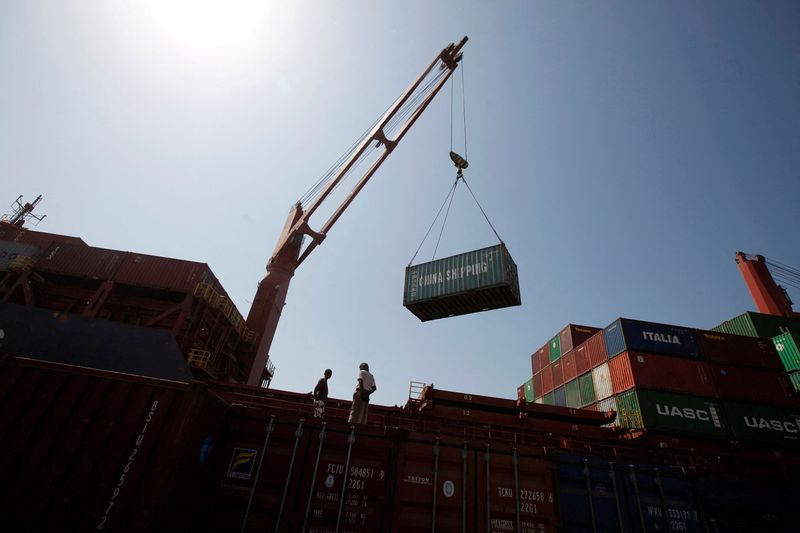By Jonathan Saul and Lisa Baertlein
LONDON/LOS ANGELES (Reuters) -Container shipping rates for key global trade routes have soared this week, with U.S. and UK air strikes on Yemen stirring fears of a prolonged disruption to global trade in Red Sea, one of the world's busiest routes, industry officials said on Friday.
U.S. and British warplanes, ships and submarines launched dozens of strikes across Yemen overnight, retaliating against Iran-backed Houthi forces for attacks on Red Sea shipping, widening regional conflict stemming from Israel's war in Gaza.
Most container ships already were avoiding the nearby Suez Canal, a shortcut between Asia and Europe that handles 12% of global trade. Now, U.S. and UK militaries have advised all ships to steer clear of the conflict zone. That stoked fears that rates for oil tankers and bulk carriers that ferry vital commodities could surge, raising the risk of a new round of global inflation.
The benchmark Shanghai Containerized Freight Index was up over 16% week-on-week to 2,206 points on Friday. The index, which measures non-contract "spot" rates for container shipments out of China's ports, has gained 114% since mid-December.
Rates on the Shanghai-Europe route rose 8.1% to $3,103 per 20-foot container on Friday from a week earlier, while the rate for containers to the unaffected U.S. West Coast soared 43.2% to $3,974 per 40-foot containers week on week, leading ship broker Clarksons said on Friday.
"The longer this crisis goes on, the more disruption it will cause to ocean freight shipping across the globe and costs will continue to rise," Peter Sand, chief analyst at freight platform Xeneta, said in Friday.
Major players in the ocean shipping industry that handles upwards of 90% of global trade are bracing for months of cost-stoking upheaval.
"Even if from today forward the Bab al-Mandeb Strait was to become safe and secure for transit, we expect it will take a minimum two months before vessels could assume normal rotational patterns," said Michael Aldwell, executive vice president for sea logistics at Kuehne + Nagel.
Major container ship owners such as Maersk and Hapag-Lloyd have switched Suez Canal-bound ships to the longer route around Africa's Cape of Good Hope. That has sent delays cascading through complex vessel schedules. Rates have at least doubled from a month ago on the most affected routes but remain below the pandemic's record highs.
On Friday, four oil tankers turned around mid-voyage to avoid the Red Sea and five others either made diversions or paused navigation.
"Tanker rates will increase and futures are up this morning," said John Kartsonas, managing partner at Breakwave Advisors, who added that dry bulk remains the least affected sector.
Major importers like Tesla (NASDAQ:TSLA), Geely-owned Volvo (OTC:VLVLY) Car and Ikea already have reported product shortages or warned of late-arriving goods.
Rerouting a ship around Africa adds roughly 10 days and $1 million in fuel costs for each one-way voyage between Asia and Europe.
Carriers are pulling vessels into the most affected European and Mediterranean trade lanes to compensate. That is reducing available vessel space for cargo moving on Transpacific and North-South routes and sending rates higher, Jefferies analyst Omar Nokta said in a note on Friday.

Vessel operators also are rolling out Red Sea-related surcharges and rationing less expensive, contract-rate space - forcing some customers' shipments into the pricier spot market.
"The price of a vast range of goods threatens to march upwards again," said Susannah Streeter, head of money and markets, Hargreaves Lansdown.